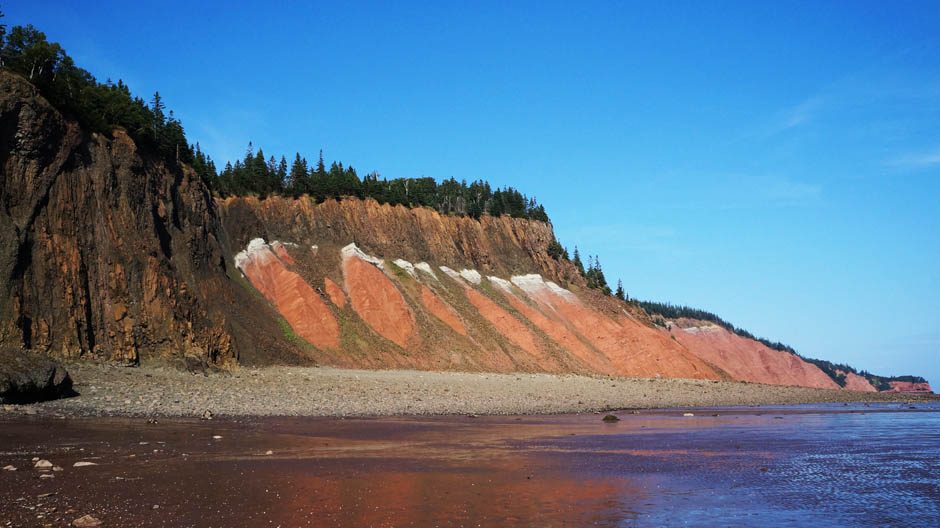The Williams Op-ed
JIM WILLIAMS: Myth-busting Northern Pulp mill pollution
In the Chronicle Herald, Dec 7, 2019. Subscription required. “Northern Pulp’s effluent is not toxic…Jim Williams is a senior research professor at St. Francis Xavier University.” It is a very lengthy Op-ed (~6500 words) so I asked Prof Williams if he could send the me the comments as submitted so they could be posted here and be publicly available. He simply referred me to the Chronicle Herald. So unfortunately, the comments remain hidden to the public at large.
Also view: Saltwire finds one scientist who thinks Northern Pulp’s effluent isn’t toxic
Halifax Examiner Morning File, Dec 9, 2019.
Helga Guderley to The Healthy Forest Coalition Dec 9, 2019 (On HFC Facebook Page):
[also published on the Chronicle Herald Dec 10, 2019, subscription required]
My Response to Mill Pollution Myth Busting...Chronicle Herald spread from December 7th
The catchy title stating that 20 years of research shows that marine ecosystem can handle Northern Pulp waste oversimplified the statements made by Jim Williams concerning the effluent from Boat Harbour. I found his presentation nuanced, prefaced as it was by the statement: “If we can guarantee that future Northern Pulp effluent is treated to the same level as it is at the present…” In parallel with Jim Williams I will start by giving my credentials. I am a retired professor, editor of Canadian Journal of Zoology and have published extensively on exercise physiology of aquatic organisms, primarily cod, trout and scallops. While not an ecotoxicologist, I have followed studies in this area for the duration of my career.
Close examination of Jim Williams’ examination of the effluent from Northern Pulp raises questions concerning his comparison of the proposed and current systems and the difficulty of extrapolating into the future of this marine ecosystem. First question: in both the print and online articles, the effluent characterized by Williams is that leaving Boat Harbour, not the effluent from the mill. Currently, after aeration, sedimentation and dilution from freshwater inflows into Boat Harbour, the effluent exits into the Northumberland Strait. Any thermal differences are minimized by time in the lagoon. Effluent from a future treatment plant would not have this thermal equilibration period and would need aeration and sedimentation to occur within the constructed treatment facility. Williams raises several concerns about the capacity of the proposed treatment system to render the services provided by Boat Harbour. I conclude that comparing the effluent from Boat Harbour to the effluent from a pipe into the strait is like comparing apples and oranges. Second question: while a marine ecosystem still exists after receiving Northern Pipe effluent for 50 years, the true question is what would the marine ecosystem be like if no effluent had entered the Northumberland Strait for all these years? To assess the impact of the effluent on the marine ecosystem, Williams proposes comparing lobster landings on the two sides of the exit from Boat Harbour, but explains that this comparison is confounded by the way lobster fishing areas have been defined. The mobility of lobsters may also confound this comparison. A historical comparison (before and after the pulp mill) would be better. Third concern: Lobster fishing is a major economic driver for Nova Scotia and there is evidence that lobster stocks are moving north-east along the Atlantic Coast, seemingly seeking cooler waters. The Northumberland Strait is one of the warmest bodies of water in Atlantic Canada. I question the wisdom of releasing warm effluent into an already warm body of water. This concern becomes more crucial in face of ever increasing ocean temperatures and increasing fragility of ocean ecosystems. Canada’s east coast has already lost its legendary cod stocks, no one wants lobsters to follow this path.
I fully agree with Williams that by being so slow to comply with the Boat Harbour Act, Northern Pulp has put itself and Nova Scotians in a very difficult situation. The provincial government is in a major conflict of interest in evaluating the treatment plant having partly financed its design. As the proposed effluent treatment affects waters touching three provinces, Environment and Climate Change Canada should carry out the environmental assessment. Northern Pulp threatens to close unless it can extend its use of Boat Harbour beyond Jan 31 2020. Full page ads and billboards around the province proclaim that Nova Scotia Needs Forestry, but Nova Scotia NEEDS to stop throwing good money after bad. Most of all, Nova Scotia NEEDS to cease this environmental racism or lose all credibility on the national and international stage.
View also:
Fishing Industry Concerns
Submitted by Juniper Law to NS Environment, Nov 8, 2019
Contents:
1. Executive Summary of Fishing Industry Concerns
2. Technical Review of Focus Report by Gulf Nova Scotia Fleet Planning Board, PEI Fishermen’s Association, and Maritime Fishermen’s Union
3. Expert Report: Finfish Health in Relation to the Proposed Northern Pulp Nova Scotia Effluent Treatment Facility, Dr. Laura M Braden, Director of Molecular Genetics & Biotechnology,
AquaBounty Canada
4. Expert Report: Expert witness report on the Focus Report for the Northern Pulp Nova Scotia Replacement Effluent Treatment Facility [Focus on Marine Environment and Fish and Fish Habitat],
Dr. Arnault Le Bris, Research Scientist in Coastal and Fisheries Ecology at the Fisheries and Marine Institute of Memorial University of Newfoundland
5. Expert Report: Review of the Northern Pulp Nova Scotia’s Focus Report Replacement Effluent Treatment Facility from an Animal Health Perspective with a Focus on Crustaceans, Dr. Andrea Battison, Principle Consultant, CrustiPath
6. Expert Report: Review of Northern Pulp’s Focus Report – Replacement Effluent Treatment Facility, NEXUS Coastal Resource Management Ltd.
NORTHERN PULP LOBBYISTS AND THE REVOLVING DOOR WITH GOVERNMENT
DECEMBER 11, 2019 BY JOAN BAXTER in the Halifax Examiner
